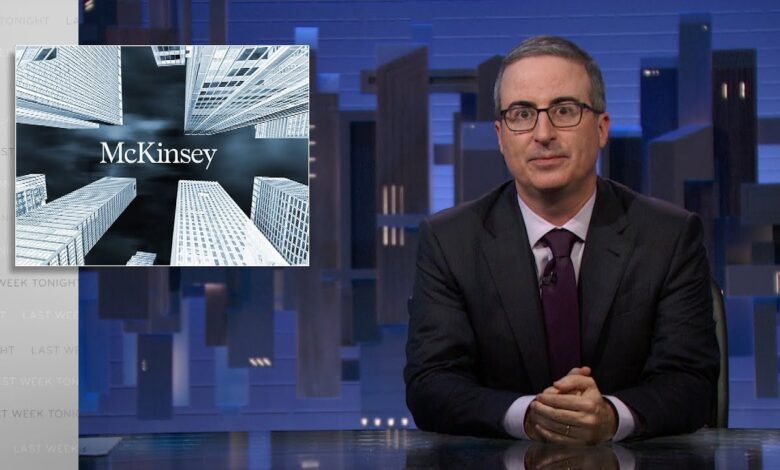john oliver mckinsey: A Deep Dive into Corporate Critique, Comedy, and Accountability

John Oliver, the acclaimed host of Last Week Tonight, has built a reputation as a fearless satirist, tackling everything from government corruption to corporate misconduct. But one of his most incisive takedowns came when he turned his attention to McKinsey & Company, a powerful, yet often shadowy, management consulting firm. With his characteristic wit and unyielding scrutiny, Oliver shed light on some troubling aspects of McKinsey’s practices. This article will take you through the highlights and implications of that exposé, exploring who John Oliver is, the role McKinsey plays in the global business landscape, and the specific issues Oliver raised in his scathing critique. john oliver mckinsey
Setting the Stage: Who is John Oliver?
Before delving into McKinsey, it’s helpful to understand the man leading this charge. John Oliver is an Emmy-winning British comedian, writer, and host of the HBO show Last Week Tonight with John Oliver. Known for blending humor with incisive journalism, Oliver has managed to attract millions of viewers seeking entertainment and education. His unique approach – combining rigorous research with satire – allows him to tackle complex, often controversial topics in a way accessible to a wide audience. john oliver mckinsey
Oliver’s show doesn’t shy away from taking on powerful institutions, and his segments often involve weeks of research, deep dives into obscure or opaque issues, and biting humor that dismantles corporate jargon and spin. With this approach, Last Week Tonight has tackled difficult subjects ranging from prison reform to government surveillance, usually providing the kind of transparency mainstream media struggles to deliver. john oliver mckinsey
What is McKinsey & Company?

McKinsey & Company, often referred to simply as McKinsey, is one of the world’s largest and most prestigious management consulting firms. Established in 1926, McKinsey has built a reputation as a “trusted advisor” to major corporations and governments across the globe. Its consultants, many of whom are Ivy League graduates, are known for offering strategic advice aimed at improving business performance, enhancing efficiency, and driving innovation. john oliver mckinsey
2.1 The Influence of McKinsey
For nearly a century, McKinsey has operated behind closed doors, offering counsel to CEOs, politicians, and industry leaders. Its influence is vast; McKinsey’s clients include 90 of the world’s 100 largest corporations and many government agencies worldwide. The firm’s advice can shape industries, influence policy, and determine the trajectory of entire economies. With such reach and influence, McKinsey has long been perceived as a formidable force in the business world, setting it apart from other consulting firms. john oliver mckinsey
2.2 McKinsey’s “Values” and Public Image
McKinsey has always been careful to cultivate a public image centered around integrity, professionalism, and results. On paper, the firm’s stated values emphasize accountability, transparency, and a commitment to making a positive impact on the world. However, as John Oliver would point out in his show, the reality of McKinsey’s practices doesn’t always align with this image. john oliver mckinsey
John Oliver’s Critique: Pulling Back the Curtain on McKinsey
In his Last Week Tonight segment on McKinsey, John Oliver didn’t merely scratch the surface of the firm’s controversial practices – he drilled down into them with a focus on transparency and accountability. Oliver’s takedown was methodical, highlighting specific instances in which McKinsey’s practices not only clashed with its stated values but also contributed to significant societal harm. john oliver mckinsey
3.1 McKinsey and Big Pharma: The Opioid Crisis
One of the most shocking revelations Oliver presented was McKinsey’s role in advising Purdue Pharma on how to “turbocharge” OxyContin sales. As the opioid crisis ravaged communities across the United States, McKinsey was working directly with Purdue to find ways to increase profits. Emails revealed that McKinsey consultants brainstormed tactics to counter “emotional messages” about the opioid crisis and suggested offering pharmacies financial incentives for opioid overdoses. john oliver mckinsey
By presenting these revelations with a mixture of outrage and humor, Oliver not only informed his viewers but also made it clear how McKinsey’s actions contributed to an ongoing public health disaster. His takedown of McKinsey in this context served as a powerful example of how corporations can prioritize profit over human welfare, often with little accountability. john oliver mckinsey
3.2 McKinsey’s Work with Authoritarian Regimes
Oliver didn’t stop at McKinsey’s involvement in the opioid crisis. He also exposed the firm’s work with several authoritarian regimes, including Saudi Arabia and China. For instance, McKinsey reportedly helped Saudi authorities identify Twitter users who were critical of the Saudi government, leading to concerns about the firm’s complicity in stifling dissent and enabling human rights abuses. john oliver mckinsey
Oliver highlighted these partnerships as part of a broader critique of McKinsey’s “values,” pointing out the contradiction between the firm’s self-promotion as a socially responsible entity and its willingness to work with governments known for repressing free speech and violating human rights. john oliver mckinsey
3.3 Environmental and Labor Concerns
McKinsey’s consulting work has also extended to industries with major environmental and labor controversies, and Oliver didn’t hesitate to bring these to light. He pointed to McKinsey’s role in advising companies involved in deforestation and environmental degradation, as well as its work with corporations accused of exploitative labor practices. john oliver mckinsey
Through a series of examples, Oliver painted a picture of McKinsey as a firm that, while championing corporate responsibility and sustainability in public, was willing to compromise these values for lucrative contracts. This duality – publicly championing ethics while privately assisting corporations and governments in ethically questionable practices – was a recurring theme in Oliver’s critique. john oliver mckinsey
Why John Oliver’s Critique Matters
John Oliver’s critique of McKinsey resonated widely because it did more than expose questionable practices; it raised important questions about corporate accountability, transparency, and the broader role of consulting firms in shaping policy and influencing powerful entities. Here’s why his takedown was particularly impactful: john oliver mckinsey
4.1 Bringing Awareness to Complex Issues
The practices of management consulting firms like McKinsey often operate far from the public eye, hidden behind layers of corporate jargon, nondisclosure agreements, and private contracts. By bringing these issues to mainstream attention, Oliver helped demystify the role of consultants in controversial areas, making complex business ethics accessible and relatable. john oliver mckinsey
4.2 Using Humor to Promote Critical Thinking
John Oliver’s use of humor allowed him to tackle these heavy topics in a way that resonated with a broad audience. By laughing along with him, viewers were also encouraged to critically examine McKinsey’s practices – and by extension, the practices of other firms and industries with similar influence. john oliver mckinsey
4.3 Reinforcing the Need for Corporate Accountability
Oliver’s segment underscored a critical gap in corporate accountability. While public companies are subject to regulations and often face scrutiny from media and activists, firms like McKinsey operate largely in the shadows, protected by client confidentiality. Oliver’s segment highlighted the need for greater oversight, transparency, and accountability in consulting, particularly when firms work with clients or industries linked to significant public harm. john oliver mckinsey
The Broader Implications: Consulting Firms and Corporate Influence
Oliver’s critique of McKinsey opens the door to a larger conversation about the role of consulting firms in the global economy. With their strategic insights and connections, consulting firms hold unparalleled influence over some of the most critical sectors of society. This raises questions about the ethical responsibilities of consultants and the impact of their advice on society at large.
5.1 The Hidden Power of Consultants
Consulting firms like McKinsey do more than advice – they shape policies, influence legislation, and impact communities. Their advice can affect job markets, shape public policy, and influence corporate decisions that touch millions of lives. Yet, these firms often escape public scrutiny, operating in a space that allows them to wield power without accountability. john oliver mckinsey
5.2 The Dangers of Prioritizing Profit over Ethics
McKinsey’s involvement in controversies such as the opioid crisis and human rights violations raises a fundamental ethical dilemma. By prioritizing profit over social responsibility, consulting firms risk damaging public trust and perpetuating harm. Oliver’s critique underscores the need for consulting firms to align their practices with ethical standards, even when it means turning down lucrative contracts. john oliver mckinsey
5.3 Rethinking Corporate Social Responsibility
John Oliver’s critique also prompts a rethinking of corporate social responsibility (CSR). McKinsey’s public commitment to values such as transparency and accountability rings hollow in light of the firm’s actions. Oliver’s exposé serves as a reminder that CSR is not just about public statements – it’s about the concrete actions companies take behind the scenes.
Looking Ahead: The Future of Corporate Accountability
As the conversation around corporate accountability grows louder, consulting firms are likely to face increasing pressure to align their practices with public expectations. Oliver’s critique of McKinsey may very well serve as a turning point, sparking greater awareness and more stringent oversight. The future may see more transparency, more responsible practices, and a more rigorous examination of consulting firms’ influence on critical sectors.
6.1 Potential Reforms in the Consulting Industry
In response to increased scrutiny, the consulting industry may see calls for reform. This could include greater transparency about consulting firms’ clients, stricter ethical guidelines, and more accountability for the outcomes of their advice. Such changes could help bridge the gap between consulting firms’ public commitments to ethics and their actual practices.
6.2 The Role of Public Advocacy and Media
Media figures like John Oliver play a crucial role in holding powerful institutions accountable. By shining a light on hidden issues, they encourage public discourse and advocacy, which can lead to real change. Oliver’s segment on McKinsey is a reminder of the power of media to bring about greater corporate accountability.
Conclusion: Comedy Meets Accountability
John Oliver’s takedown of McKinsey & Company illustrates the powerful role that satire and journalism can play in promoting accountability. Through humor, research, and unapologetic critique, Oliver managed to peel back the layers of secrecy surrounding McKinsey, making its questionable practices visible to the public. As the influence of consulting firms continues to grow, the need for transparency, accountability, and ethical integrity has never been more urgent. In the end, Oliver’s critique serves as both an exposé and a call to action, reminding viewers that corporate power, unchecked, can have consequences that reach far beyond the boardroom.

